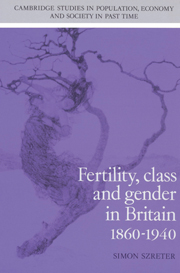Book contents
- Frontmatter
- Contents
- List of figures
- List of tables
- Acknowledgements
- List of abbreviations
- Introduction
- Part I Historiographical introduction: a genealogy of approaches
- Part II The professional model of social classes: an intellectual history
- Part III A new analysis of the 1911 census occupational fertility data
- Part IV Conceptions and refutations
- 9 A general approach to fertility change and the history of falling fertilities in England and Wales
- 10 Social class, communities, gender and nationalism in the study of fertility change
- Appendices
- Bibliography
- Index
- Cambridge Studies in Population, Economy and Society in the Past Time
10 - Social class, communities, gender and nationalism in the study of fertility change
Published online by Cambridge University Press: 16 February 2010
- Frontmatter
- Contents
- List of figures
- List of tables
- Acknowledgements
- List of abbreviations
- Introduction
- Part I Historiographical introduction: a genealogy of approaches
- Part II The professional model of social classes: an intellectual history
- Part III A new analysis of the 1911 census occupational fertility data
- Part IV Conceptions and refutations
- 9 A general approach to fertility change and the history of falling fertilities in England and Wales
- 10 Social class, communities, gender and nationalism in the study of fertility change
- Appendices
- Bibliography
- Index
- Cambridge Studies in Population, Economy and Society in the Past Time
Summary
The sections of this final chapter offer a series of summary discussions of the wider implications of the foregoing new interpretation of fertility change in modern Britain. In the first section there is a consideration of how to envisage the general form of the historical process of falling fertilities in a way which is compatible with the variation found between different communities and social groups in Britain. This discussion is in three parts. First, it is argued that the processes of change, far from being a unitary and unifying event, should be understood as socially divisive. Fertility changed through a developmental sequence of contingent phases, rather than comprising a single, smooth ‘transition’. Secondly, it is pointed out that this crucially means that descriptions and explanations which are accurate for one part of the process – the final stages after the Great War, for instance – do not necessarily provide helpful leads for understanding the origins and earlier stages of the processes of change. The opposite assumption is a fallacy that has informed the established demographic approach. Thirdly, the section concludes with a consideration of the extent to which the history of fertility control in Britain may represent an unusual or unique course of events, compared with other European countries at the time.
In the second section of the chapter there follows a discussion of historians’ current understandings of class relations in modern British society.
- Type
- Chapter
- Information
- Fertility, Class and Gender in Britain, 1860–1940 , pp. 533 - 602Publisher: Cambridge University PressPrint publication year: 1996



